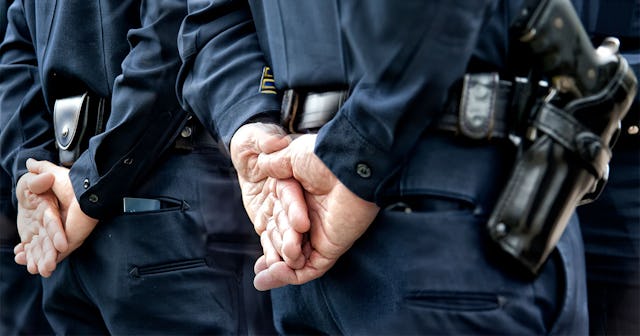It's Time To Reimagine Our Police System — Here's How

If Derek Chauvin was found not guilty, it would have sent a clear message that the murder of Black people is acceptable. It is not. For Black people, we know what it feels like to walk out of our house, wondering if we will return that evening. What if I get stopped by a cop for running a red light? Or for turning without using a signal? What if I get stopped due to a mistaken identity? Driving while Black is a thing, and has caused many arrests fueled by racism. It can literally take something as minor as having an air freshener hanging from the rearview mirror.
Even when a cop passes me on the highway, or I see their flashing lights behind me, I ask myself: Was I speeding? Did I pay my car insurance? I am a very safe driver and I follow all of the rules and my insurance is automatically deducted from my bank account every month. But I walk with fear, travel with anxiety, and live my life in fear of what I’d do — or what would happen to me — if I was pulled over by a cop on any given day. Our police system knows no other way than using force, sometimes excessive, in the name of the law.
We can travel way back to slavery when policing was the way to catch runaway slaves, to enforce the law of the land of the time. Racial profiling and policing through the lens of racial bias — a policeman’s misguided approach to policing a community of color — causes murders like George Floyd’s. We must reimagine the way we “do” policing in this country. Because any time a Black or Brown person leaves their home, they should be able to do so with all the confidence that they are not one traffic stop away from being murdered.
Douglas Sacha/Getty
Cops have power and they know it. But all too often, they choose to use their power against Black and Brown people. They are just trying to “keep people safe” is what we hear. But, safe from who? We need to be kept safe from THEM. Why must armed police be called in when, say, someone is going ten miles per hour over the posted speed limit, or when a tail light is out — do we really need a man with a gun to write us a ticket? Hell no!
When people commit traffic infractions, the best responders aren’t people with guns. Author of “Chokehold: Policing Black Men” and Georgetown Law Professor Paul Butler hit the nail on the head when he told NPR, “We see that too often when people with guns are required to respond to minor, petty offenses, the consequences can be tragic.”
What if there was a team of officers who — when calls came in about, say, a customer giving a fake $20 bill to pay for a few items at a convenience store — were armed only with their common sense and their tone, replacing guns and tasers? What if there was a team of officers who were called in to help someone having a psychotic break, and instead of shooting them to subdue them, they called in mental health social workers or psychiatrists to provide the necessary attention and care? We’ve allowed and supported our police force to be the ones we call when anything happens or goes wrong. And we should be able to call them to handle situations, but sometimes they can make situations worse.
Jose Maria Hernandez/EyeEm/Getty
In any given year, police across the United States respond to over 2 million 911 calls in a year; that doesn’t even take into account all the routine traffic stops and patrols. Of all that police activity, only a fraction should require the use of a weapon — but for Black and Brown folks, it happens all too often. We need police reform, and it needs to start now.
The facts speak for themselves when it comes to policing in the United States. According to the ACLU: “Every three seconds a person is arrested in the United States. According to the FBI, of the 10.3 million arrests a year, only 5 percent are for offenses involving violence. All other arrests are for non-violent offenses — these include many relatively minor infractions like money forgery, the alleged crime that the cops who killed George Floyd arrived to investigate.”
There are many ways we can reimagine policing, but the ACLU lays out three specific steps: 1) Prohibit police from making arrests or issuing fines for non-violent offenses or non-dangerous behaviors, limiting unnecessary interactions and decreasing deaths within Black and Brown communities; 2) Reallocating police budgets to create alternatives to the current methods of policing; 3) Implement legal constraints to limit the instances in which police are allowed to use weapons.
But in order to reimagine policing, we need to first deal with the real issue: racism.
Let’s focus on training police officers to think with their hearts and minds before they react with their guns. It won’t be a one-and-done process where a police force collectively goes through a training and then everything is “fixed.” But with police departments across the U.S. managing budgets upwards of $115 billion dollars, at least a fifth of it should be earmarked for training, additional resources to help keep good cops on the job and weed out the bad ones. To reimagine policing, it means we must also reimagine how we look at, understand, and respond to societal issues like poverty, homelessness, drug abuse and mental health issues.
But the police cannot do this alone. Together, as a tired community of people, in partnership with the police, we can change the way our very society works.
This article was originally published on